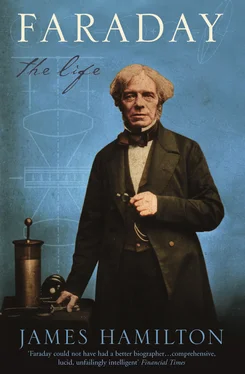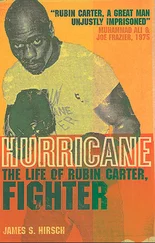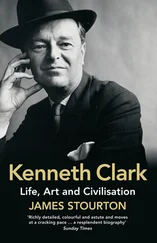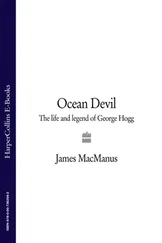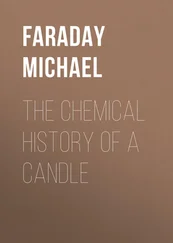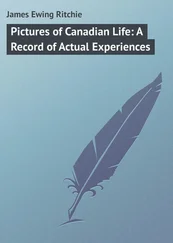1 ...6 7 8 10 11 12 ...30 By the time he had reached the sixth lecture, on Radiant Matter, 29 February, Leap Year’s Day, the audience had become an old friend, a familiar pattern of faces and attitudes spread out with neat variations like a carpet before him. There was a settling hush; the audience breathed, coughed, muttered and moved vaguely, shifting in expectation as Davy came in from the back and stood behind the speaker’s desk. He put his hand on a large lens on a brass stand and moved it a few inches to the left. A vacuum pump he moved slightly to the right. At the far end of the bench was a wooden stand about three feet high with an arm holding a bowl of glowing charcoal near the top, an empty pan near the bottom, and enclosing them both a pair of concave mirrors, like cymbals held wide and about to be clashed together by a bandsman. He gazed about the auditorium, took a deep breath and began to speak. The words flew from him – this lecture was about light, its source and radiance, its reflection and refraction, the way prisms and mirrors can transmit, split and reunite it, the discoveries of Newton, Wollaston and William Herschel. The audience was in his hand from his first utterance as his eyes swept over them and he addressed first one section, then another, then a third, and leant this way then that for emphasis.
When Davy looked up to check his time, he probably did not notice, sitting beside George Dance in the balcony above the clock, a young man with curly brown hair, a black worsted suit and a stock at his neck. On his knees the young man had a tall black hat, and on top of the hat some folds of paper and a pencil. He was attending very carefully to what Davy was saying, taking notes and watching the performance with eager interest. This young man was Michael Faraday. He watched carefully as Davy ran beams of rainbow light from one end of the bench to the other. White light came out of a lamp on the speaker’s left, was focused into a prism, split into rainbow colours, twisted this way and that by other lenses and prisms, and then back again as white light to illuminate a sheet of card. A stray rainbow beam broke out of this neat arrangement of paraphernalia to strike out across the theatre and land on the wall above Michael Faraday’s head. Then Davy turned to the stand with the concave mirrors. An assistant blew on the pan of charcoal with a pair of bellows, and the twigs glowed bright red. Davy adjusted the lower, smaller pan, and sprinkled some black powder into it. He hesitated, and as he did so the lower pan exploded with a flash and a violent hiss, scattering burning debris onto the bench and causing a sudden shriek of surprise from the audience, followed by silence, then embarrassed laughter. Davy paused before addressing the audience: ‘It is evident that in this experiment the whole of the effect must take place by the radiated heat for none can descend by other means from the pan of coals to the powder.’ 24
As the lecture series progressed, Davy might have become aware of the young man above the clock. Faraday did not attend all the lectures, just four out of the ten, but not only did he take notes, which he wrote out again at home in the neatest copperplate hand, he also made drawings of the apparatus Davy had used. 25This will have taken him down to the demonstration table after the lecture had ended to get a closer look, and if Davy had not spoken to the young man there and then, he might at least have been aware of a presence.
Humphry Davy and Jane Apreece justified the gossips, for on 11 April 1812 they were married in Jane’s mother’s drawing room, by the Bishop of Carlisle himself. ‘I am the happiest of men,’ Davy wrote to his own mother shortly before the wedding, ‘in the hope of union with a woman equally distinguished for virtues, talents and accomplishments … I believe I should never have married, but for this charming woman, whose views and whose tastes coincide with my own, and who is eminently qualified to promote my best efforts and objects in life.’ 26
The wedding day was the culmination of an extraordinary week. At a levée at St James’s Palace on the Wednesday the Prince Regent knighted Humphry Davy; on the Friday Davy gave his final lecture, on Metals, to echoing cheers, and on the Saturday he was married. If either one of the couple echoed the character of Corinne, adored by the Roman throng when she was crowned for her poetry, it was not Jane, but Humphry. Sitting up behind the clock on the evening of 10 April, Michael Faraday heard the newly created Sir Humphry Davy conclude his lectures at the Royal Institution with words which went to the heart of why it was that scientists did what they did, and how, by experiment, they could discover answers from nature. Davy’s words also touched on his own personal happiness and fulfilment, and added fire to Faraday’s determination to give his life to experimental science:
Experiment is as it were, the chain that binds down the Proteus of nature, and obliges it to confess its real form and divine origin. The laws that govern the phenomena of chemistry, produce invariable results; which may be made the guide of operations in the arts; and which insure the uniformity of the systems of nature, the arrangements of which are marked by creative intelligence, and made constantly subservient to the production of life, and the increase of happiness. 27
According to John Davy, Sir Humphry was back in his laboratory within days of his marriage. 28In June he gave a paper to the Royal Society, and in July he and Lady Davy set off for the Highlands of Scotland. Sir Humphry proposed to spend his time there fishing and shooting, but, with his portable chemical apparatus securely stowed in the carriage, he also went prepared to analyse earth or rock samples, or carry out whatever chemical experiments might move him while he and his wife were away. They planned to return to London in December. 29
CHAPTER 3 A Small Explosion in Tunbridge Wells
In the summer of 1812, cool and wet according to reports, 1Faraday stayed in London, looking urgently for a job in science. There were six months left of his apprenticeship with George Riebau; two weeks after his twenty-first birthday he would be out on his own – with no job and no money unless he got on with it and found a position. But skilled as he had become over the past seven years with Riebau, Faraday knew that bookbinding would never satisfy him for life. Ever since he had first heard Tatum lecture, had seen the encyclopedias, the books on galvanism, optics, perspective, electricity and all the philosophies that reveal the workings of nature, and yet more since he had witnessed the revelations of fact in Sir Humphry Davy’s lectures, he was determined on a life in science.
He wrote to Sir Joseph Banks, the grand, corpulent and omnipotent botanist, President of the Royal Society, to ask for work in science – anything at all, even scrubbing and washing bottles. He walked across London, perhaps on his way to Tatum’s or to the Sandemanian chapel, taking the letter to the Royal Society’s rooms in Somerset House and leaving it with the porter. Two or three days later he called for a reply; there was none. He called again and again over the following week or ten days, and each time asked the porter if Sir Joseph had an answer for him. There was still silence, and an answer was never handed down. Word must have got back to Banks’s office that a lad was pestering, and when Faraday returned the next time he found that the porter did have a message for him from the President’s office. It was: ‘Your letter requires no answer.’ A memorandum written in 1835 (see Appendix Three) says that this response left Faraday ‘almost disconsolate’. 2We might infer from this that he went round the corner, sat on a stone coping and wept.
In July 1812 an opportunity turned up, and Faraday applied for ‘an excellent prospect’ in London, perhaps as a tutor or calculator of numerical tables. He seems to have been offered the post, but despite his great talent for sciences, mathematics always evaded him:
Читать дальше
